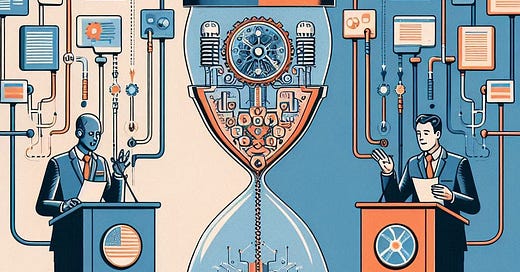During election campaigns, it becomes increasingly evident how our politicians often navigate a landscape of formalizations. Listen to a traditional political debate and you rarely hear a human speaking - you hear a machine trained in layers upon layers of rules about what is acceptable to say and not say. The answers come as if on autopilot, carefully formulated to avoid pitfalls and appear consistent with the party line.
What fascinates me is how this formalization of political discourse creates its own form of communication - characterized by predictability, repetition of key messages, and carefully calibrated statements. It reminds me of what happens in social services when documentation templates and guidelines begin to shape language and thinking - we start speaking like our systems.
The Trump phenomenon offers an interesting contrast. His communication style represents in many ways the opposite of the formalized politician. He speaks like a human - unfiltered, associative, emotional, and impulsive. He breaks the unwritten rules of political communication in a way that feels liberating to some and frightening to others.
In the hourglass metaphor, politicians occupy a paradoxical position. They shape the system from above through legislation, while simultaneously, in a democracy, deriving their legitimacy from below - from the people. This dual role creates a special tension: for the system to function, politics needs to be formalized, but to remain democratically vital, it must maintain its connection to people's lived experiences.
In this tension arises the question of trust. When politicians speak like machines, programmatically and predictably, they often undermine trust in the institutions they represent. Paradoxically, even unfiltered, "human" communication can erode trust when it breaks norms of objectivity and continuity. The real challenge for our democratic institutions is to create space for both formalized structure and authentically human communication - both are needed in a functioning social contract.
Perhaps the balance ultimately lies in seeing formalization as a tool, not an end in itself. Laws, routines, and protocols should serve human needs, not shape us into their servants. When the structure of the machine and human creativity unite in mutual respect, then we can build institutions worthy of our trust.
A reflection on Social Work





